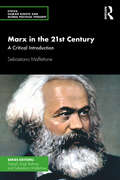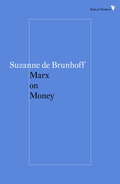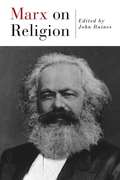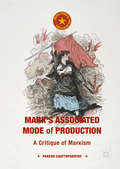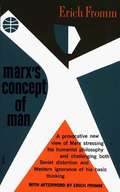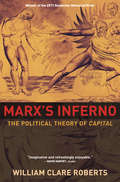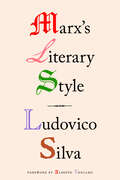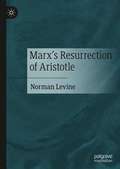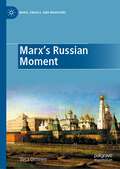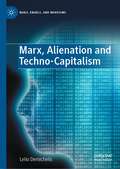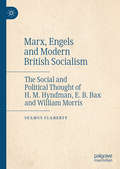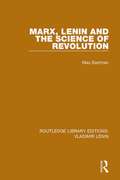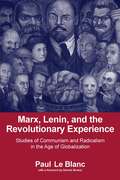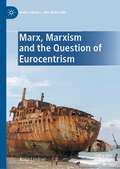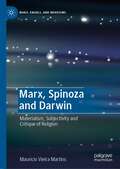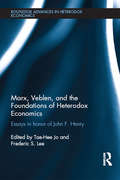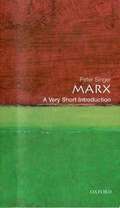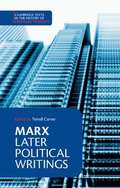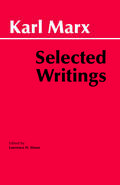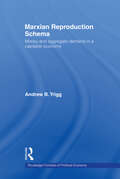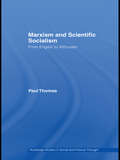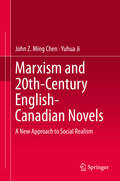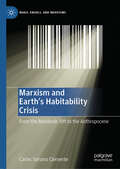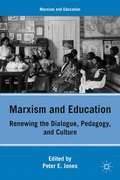- Table View
- List View
Marx in the 21st Century: A Critical Introduction (Ethics, Human Rights and Global Political Thought)
by Sebastiano MaffettoneThis book introduces Marx as a political philosopher to the 21st-century reader. Equal parts comprehensive, accessible, and engaging, it presents an unconventional reinterpretation of class struggle. Maffettone sheds light on Marx the individual, the intellectual, the political leader and icon, and links his lasting legacy to contemporary theories of justice. As one of the most prominent intellectual presences in history, Marx should not be read as a theorist of communism and socialism. Rather, he was, is, and shall remains today and remain for the foreseeable future, a radical critic of liberalism and capitalism. Within this innovative interpretive framework, he must be kept absolutely present in the analysis of contemporary politics. Under such premise, the volume explores Marx’s life, his thoughts, his most important writings, his works on historical materialism and economic theory with a focus on concepts of labor, commerce, capitalism, and surplus. The book also includes discussions on the Manuscripts of 1844, the Manifesto of 1848, and a brief critical summary of Capital. A truly definitive work on the "phenomenon" that is Marx, this critical introduction will be of immense interest to scholars and researchers of political science, modern history, cultural studies, social anthropology, political philosophy, critical theory, justice, and economics, as well as appeal to the general reader.
Marx on Money
by Suzanne De BrunhoffThe republication of Suzanne de Brunhoff's classic investigation into Karl Marx's conception of "the money commodity" shines light on commodities and their fetishism. The investigation of money as the crystallization of value in its material sense is central to how we understand capitalism and how it can be abolished. Marx on Money is an elegant analysis of how money, credit, debt and value fit into the "logic of capital" that characterizes commodity society.From the Trade Paperback edition.
Marx on Religion
by John RainesReligious suffering is at one and the same time the expression of real suffering and a protest against real suffering. Religion is the sigh of the oppressed creature, the heart of a heartless world and the soul of soulless conditions. Few people would ever expect that Karl Marx is the writer of the above statement. He not only wrote it, but he did so in the same breath of his more famous dictum that "religion is the opiate of the masses. " How can one reconcile such different perspectives on the power and ubiquity of religion?In this compact reader of Marx's essential thought on religion, John Raines offers the full range of Marx's thoughts on religion and its relationship to the world of social relations. Through a careful selection of essays, articles, pamphlets, and letters, Raines shows that Marx had a far more complex understanding of religious belief. Equally important is how Marx's ideas on religion were intimately tied to his inquiries into political economy, revolution, social change, and the philosophical questions of the self. Raines offers an introduction that shows the continuing importance of the Marxist perspective on religion and its implications for the way religion continues to act in and respond to the momentous changes going on in our social and environmental worlds. Marx on Religion also includes a study guide to help professors and students-as well as the general reader-continue to understand the significance of this often under-examined component of Marx.
Marx's Associated Mode of Production: A Critique of Marxism (Marx, Engels, and Marxisms)
by Paresh ChattopadhyayThis book aims to restore Marx’s original emancipatory idea of socialism, conceived as an association of free individuals centered on working people’s self- emancipation after the demise of capitalism. Marxist scholar Paresh Chattopadhyay argues that, Marx’s (and Engels’s) ideas have been deliberately warped with misinterpretation not only by those who resent these ideas but more consequentially by those who have come to power under the banner of Marx, calling themselves communists. This book challenges those who have inaccurately revised Marx’s ideas justify their own pursuit of political power.
Marx's Concept of Man
by Erich H. FrommA provocative new view of Marx stressing his humanist philosophy and challenging both Soviet distortion and Western ignorance of his basic thinking.
Marx's Inferno: The Political Theory of Capital
by William Clare RobertsMarx’s Inferno reconstructs the major arguments of Karl Marx’s Capital and inaugurates a completely new reading of a seminal classic. Rather than simply a critique of classical political economy, William Roberts argues that Capital was primarily a careful engagement with the motives and aims of the workers’ movement. Understood in this light, Capital emerges as a profound work of political theory. Placing Marx against the background of nineteenth-century socialism, Roberts shows how Capital was ingeniously modeled on Dante’s Inferno, and how Marx, playing the role of Virgil for the proletariat, introduced partisans of workers’ emancipation to the secret depths of the modern “social Hell.” In this manner, Marx revised republican ideas of freedom in response to the rise of capitalism.Combining research on Marx’s interlocutors, textual scholarship, and forays into recent debates, Roberts traces the continuities linking Marx’s theory of capitalism to the tradition of republican political thought. He immerses the reader in socialist debates about the nature of commerce, the experience of labor, the power of bosses and managers, and the possibilities of political organization. Roberts rescues those debates from the past, and shows how they speak to ever-renewed concerns about political life in today’s world.
Marx's Literary Style
by Ludovico SilvaMarx&’s Literary Style argues that a true understanding of Marx&’s work requires a careful study of his literary choicesIn Marx&’s Literary Style, the Venezuelan poet and philosopher Ludovico Silva argues that much of the confusion around Marx&’s work results from a failure to understand his literary mode of expression. Through meticulous readings of key passages in Marx&’s oeuvre, Silva isolates the key elements of his style: his search for an &“architectonic&” unity at the level of the text, his capacity to express himself dialectically at the level of the sentence, and, above all, his great gift for metaphor. Silva&’s unique sensitivity to Marx&’s literary choices allows him to illuminate a number of terms that have been persistently, and fatefully, misunderstood by many of Marx&’s most influential readers, including alienation, reflection, and base and superstructure. At the heart of Silva&’s book is his contention that we we cannot hope to understand Marx if we treat him as a scientist, a philosopher, or a literary writer, when he was in fact all three at once.Originally published in 1971, this is a key work by one of the most important Latin American Marxists of the twentieth century. This edition, which marks the first appearance of one of Silva&’s works in English, features an introduction by Alberto Toscano.
Marx's Resurrection of Aristotle
by Norman LevineThis book seeks to show how Karl Marx’s vision of communism was a continuation of Aristotle’s classical humanist philosophy. Challenging the Engelsian distortion of Marx, it presents a negation of previous interpretations of Marx which present him in materialist terms. Engels proposed a picture of the highest stage of communist society as an economic egalitarianism, a vision which became an axiom of Leninist-Stalinist-Soviet Communism. By contrast, here it is shown that Marx embraced the Aristotelian concept of “distributive justice”, of proportionate equality. Spanning the works of Marx, from his university education and doctoral dissertation on the differences between the Democritean and Epicurean philosophy of the atom, to the study of his Rheinische Zeitung period and the persistence of classical humanism in Marx’s defense of the freedom of the press, Levine skillfully reveals the gravitational pull between Marx and Aristotle.Showing how classical humanism is the dominant ethos in the communism of Marx, the book includes chapters on:Hegel as a transition point between Aristotle and MarxThe links between Marx’s theory of labor and Aristotle’s idea of the constitutive subject located in The Politics How the local methodologies of Aristotle and Hegel provided Marx with the social methodologies by which to interpret the functioning of capitalismMarx's Resurrection of Aristotle is the culmination of Norman Levine's life-long work to establish the correct placement of Marx and Marx’s communism within the classical humanist tradition.
Marx's Russian Moment (Marx, Engels, and Marxisms)
by Vesa OittinenThis book discusses Marx’s relations with Russia, which have always been ambivalent. In his youth, and indeed a good way into the 1860s, Marx might even be called a “Russophobe.” Around 1870, however, his views on Russia undergo a change; he becomes acquainted with a new kind of Russian radical and revolutionary movement and begins to study Russian. It becomes clear that Marx begins to feel that Russia is some kind of a “touchstone” for his theories. Offering a new and original interpretation of Marx’s theoretical development, Marx’s Russian Moment analyzes the following themes: Marx’s concept of ideology (as developed in the German Ideology) and its fortunes in Russia; Marx’s encounter with Bakunin and Russian nihilism; Marx’s and Engels’s studies of primitive societies; Engels’s views of the developmental perspectives of small Slavic nations; and Marx’s views on Finland, the Russian Grand Duchy. Considering these topics as “case studies,” Oittinen argues that Marx’s encounter with Russia substantially influenced Marx’s (and Engels’s) views not just on current political and economic matters but also on a philosophical and methodological level.
Marx, Alienation and Techno-Capitalism (Marx, Engels, and Marxisms)
by Lelio DemichelisIn this book, translated into English for the first time, Lelio Demichelis takes on a modern perspective of the concept/process of alienation. This concept—much more profound and widespread today than first described and denounced by Marx—has largely been forgotten and erased. Using the characters of Narcissus, Pygmalion and Prometheus, the author reinterprets and updates Marx, Nietzsche, Anders, Foucault and, in particular, critical theory and the Frankfurt School views on an administered society (where everything is automated and engineered, manifest today in algorithms, AI, machine learning and social networking) showing that, in a world where old and new forms of alienation come together, man is increasingly led to delegate (i.e. alienate) sovereignty, freedom, responsibility and the awareness of being alive.
Marx, Engels and Modern British Socialism: The Social and Political Thought of H. M. Hyndman, E. B. Bax and William Morris
by Seamus FlahertyThis book is a reception study of Karl Marx’s and Friedrich Engels’ ideas in Britain during the late nineteenth century and a revisionist account of the emergence of modern British socialism. It reconstructs how H. M. Hyndman, E. B. Bax, and William Morris interacted with Marx and ‘Marxism’. It shows how Hyndman was a socialist of liberal and republican provenance, rather than the Tory radical he is typically held to be; how Bax was a sophisticated thinker and highly influential figure in European socialist circles, rather than a negligible pedant; and it shows how Morris’s debt to Bax and liberalism has not been given its due. It demonstrates how John Stuart Mill, in particular, was combined with Marx in Britain; it illuminates other liberal influences which help to explain the sectarian attitude adopted by the Social Democratic Federation towards organised labour; and it establishes an alternative genealogy for Fabian socialism.
Marx, Lenin and the Science of Revolution
by Max F. EastmanA critique of the science of Marxism by the American journalist and philosopher Max Eastman.
Marx, Lenin and the Science of Revolution (Routledge Library Editions: Vladimir Lenin #1)
by Max EastmanThe result of 10 years' worth of painstaking research, this volume, originally published in 1926 is a sympathetic critique of certain phases of revolutionary dictatorship in Russia. Among other things it focusses on the philosophy and psychology of Marxism, Marxian economics, Bolshevism, the philosophy of Lenin and his role as an engineer of revolution, the Mensheviks, and the anarchist contribution.
Marx, Lenin, and the Revolutionary Experience: Studies of Communism and Radicalism in an Age of Globalization
by Paul LeBlancMarx, Lenin, and the Revolutionary Experience offers a fresh look at Communism, both the bad and good, and also touches on anarchism, Christian theory, conservatism, liberalism, Marxism, and more, to argue for the enduring relevance of Karl Marx, and V.I. Lenin as democratic revolutionaries. It examines the "Red Decade" of the 1930s and the civil rights movement and the New Left of the 1960s in the United States as well. Studying the past to grapple with issues of war and terrorism, exploitation, hunger, ecological crisis, and trends toward deadening "de-spiritualization", the book shows how the revolutionaries of the past are still relevant to today's struggles. It offers a clearly written and carefully reasoned thematic discussion of globalization, Marxism, Christianity (and religion in general), Communism, the history of the USSR and US radical and social movements.
Marx, Marxism and the Question of Eurocentrism (Marx, Engels, and Marxisms)
by Kolja LindnerThis book mediates between postcolonial positions that criticize Marxist approaches (and Marx’s writings) for their Eurocentrism and defenders of Marx, who claim that this accusation is a myth. In different contributions to this volume, Kolja Lindner pleads for a differentiated assessment of the whole of Marx’s work, including less known manuscripts, and a theoretical reconstruction of various elements that have come into the focus of postcolonial critique: ethnocentrism, Orientalism, false universalism and the oblivion of modernity’s global entanglement. Against this background, two opportunities simultaneously arise: Marx’s Eurocentrism can be deconstructed and his growing awareness of global developments and cosmopolitan struggles established.
Marx, Spinoza and Darwin: Materialism, Subjectivity and Critique of Religion (Marx, Engels, and Marxisms)
by Mauricio Vieira MartinsMarx, Spinoza and Darwin presents a common thread in its argument: it shows how these authors—certainly with differences among themselves—consolidated a field of investigation that does not resort to transcendent or religious premises in approaching the phenomena they analyze. Thus, when Spinoza declared that the “will of God” is the “sanctuary of ignorance,” when Marx provocatively maintained that “criticism of religion is the premise of all criticism,” or when Darwin polemicized against a millennial creationist approach, all were taking a stand that invited us to view our world through a secular and immanent lens. In addition to this common thread, Martins discusses other issues present in the works of these thinkers, for instance the space that exists for human subjectivity from a Marxist perspective (which is not to be confused with philosophical “objectivism”): men and women are encouraged to act in the world. With this conceptual background, the concluding chapters of the book address the proliferation of some less examined Christian fundamentalisms in contemporary world, presenting an explanatory hypothesis for the phenomenon.
Marx, Veblen, and the Foundations of Heterodox Economics: Essays in Honor of John F. Henry (Routledge Advances in Heterodox Economics)
by Tae-Hee Jo Frederic LeeJohn F. Henry is an eminent economist who has made important contributions to heterodox economics drawing on Adam Smith, Karl Marx, Thorstein Veblen, and John Maynard Keynes. His historical approach offers radical insights into the evolution of ideas (ideologies and theories) giving rise to and/or induced by the changes in capitalist society. Essays collected in this festschrift not only evaluate John Henry’s contributions in connection to Marx’s and Veblen’s theories, but also apply them to the socio-economic issues in the 21st century. In Part I leading heterodox economists in the traditions of Marxism, Post Keynesianism, and Institutionalism critically examine Marx’s and Veblen’s theoretical frameworks (and their connections to each other) that have become the foundations of heterodox economics. Chapters in Part II showcase alternative theoretical explanations inspired by Marx, Veblen, and Henry. Topics in this Part include financial crisis, financialization, capital accumulation, economics teaching, and the historical relationship between money and class society. Part III is devoted to John Henry’s heterodox economics encapsulated in his "farewell" lecture, interview, and bibliography. Essays in this book, individually and collectively, make an important point that the history of economic thought (or historical analysis of economic theory and policy) is an integral part of developing heterodox economics as an alternative theoretical framework. Anyone who is troubled by the recurring failure of capitalism as well as mainstream economics will find this book well worth reading.
Marx: A Very Short Introduction
by Peter SingerMarx wrote at such enormous length, on so many different subjects, that it is not easy to see his ideas as a whole. I believe that there is a central idea, a vision of the world, which unifies all of Marx's thought and explains what would otherwise be puzzling features of it. In this book I try to say, in terms comprehensible to those with little or no previous knowledge of Marx's writings, what this central vision is.
Marx: Later Political Writings
by Karl Marx Terrell CarverMarx: Later Political Writings brings together the most important texts in political philosophy written by Marx after 1848. All are in new translations, and the collection is introduced by the leading Marx scholar Terrell Carver. Unlike other collections, the works are presented complete, according to their earliest edition or manuscript text, and include the Manifesto of the Communist Party, and the little-known Notes on Adolph Wagner. These texts allow the close contact between Marx and contemporary politics to emerge in a clearer light.
Marx: Selected Writings (Hackett Classics)
by Karl Marx Lawrence H. SimonFeaturing the most important and enduring works from Marx's enormous corpus, this collection ranges from the Hegelian idealism of his youth to the mature socialism of his later works. Organized both topically and in rough chronological order, the selections (many of them in the translations of Loyd D. Easton and Kurt H. Guddat) include writings on historical materialism, excerpts from Capital, and political works.
Marxian Reproduction Schema: Money and Aggregate Demand in a Capitalist Economy (Routledge Frontiers of Political Economy)
by Andrew TriggIn 1878 Karl Marx developed the reproduction schema: his model of how total capital is produced and reproduced. This is thought to be the first two-sector economic model ever constructed. Two key aspects of Marx’s writings are widely agreed to be undeveloped: The role of aggregate demand and the role of money. This book synthesizes various strands of economic thought to enable the reader to understand and clarify the structure of the reproduction schema. This synthesis will challenge prevailing orthodoxies. This book constructs a macro monetary model which draws on a wide range of economic theories, within both the Marxian economic tradition, and the tradition of Keynes, Kalecki, Domar, Sraffa and Leontief. Marxian economics has been dominated by supply-side thinking, including general equilibrium theory and pronouncements about the shortage of surplus value, whilst Post Keynesians have failed to take seriously the importance of reproduction and the multisectoral structure of capitalism. By locating aggregate demand and the circuit of money in the reproduction schema, this key book provides an analytical contribution to both Marxian and Post Keynesian economics.
Marxism & Scientific Socialism: From Engels to Althusser (Routledge Studies in Social and Political Thought)
by Paul ThomasEngels declared at Marx’s funeral in Highgate Cemetery that "just as Darwin discovered the law of development of organic nature, so Marx discovered the law of development of human history". Scientific socialism was the term Engels used to describe Marx's socio-economic philosophy and many later theorists sought to reinforce Marxist theory with a supposedly scientific basis. This book explains the development of the idea of scientific socialism through the 19th and 20th century from its origins in Engels to its last manifestation in the work of Althusser. It provides a detailed analysis of Engel's own conceptualisation, the impact of Darwin, the relationship to the 'official' historical materialism of the Soviet states and later reformulations by Althusser and others. In so doing it provides a vivid intellectual history of Marxist and socialist thought, exploring its significant insights as well its manifest failures. Marxism and Scientific Socialism will be of particular interest to those with an interest in the development of Marxism and socialism, political ideologies and the history of Western political thought.
Marxism and 20th-Century English-Canadian Novels
by John Z. Ming Chen Yuhua JiThis monograph is the first academic work to apply a neo-Marxist approach to 20th-century Canadian social realist novels, pursuing a refreshingly (neo-)Marxist approach to such issues as Bakhtinian notions of the novelistic form and dialogism as applied to Canadian socio-political novels influenced by various socialisms, socialist-feminist concerns, economic and sexual politics, and the genre of social realism. In so doing, it demonstrates that Marxist socialism is as relevant today as it was in the 1930s, just as social realist novels continue to thrive as a critique of capitalism. Readers will find valuable insights into the social significance, formal innovations, moral sensitivity, aesthetic enrichment, and ideological complexity of Canadian social realist novels.
Marxism and Earth's Habitability Crisis: From the Metabolic Rift to the Anthropocene (Marx, Engels, and Marxisms)
by Carles Soriano ClementeThis book argues that as long as capitalism is globally dominant, there must be a crisis of habitability on Earth. Overcoming this crisis is not a matter of technology. Technological strategies need to be adopted to mitigate human impact on Earth, but as long as they are implemented on a capitalist basis the crisis will not be overcome. Unfortunately, this is not fully understood today, and initiatives to confront the crisis based on idealism and positivism flourish everywhere. This makes research into the main epistemological reasons for the misunderstanding of the relationship between the reproduction of capital and the crisis of habitability an urgent task, which is undertaken throughout the book. Such misunderstanding is ultimately related to the old problem of philosophy, the relationship between thought and being. A problem that the crisis of habitability expresses as the insurmountable contradiction between capitalist humans and nature.
Marxism and Education
by Peter E. JonesMarxist thinking can offer a critical understanding of education in an international context. Jones tackles these issues from a variety of angles and perspectives, taking advantage of recent theoretical innovations in Marxist analysis as well as the personal experiences of educational practitioners with Marxist commitments. With a specific focus on pedagogical practices as cultural practices, this book combines detailed case studies of local situations with broad, critical overviews of global development and challenges. "
